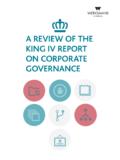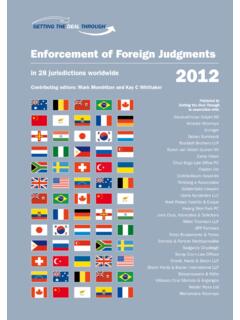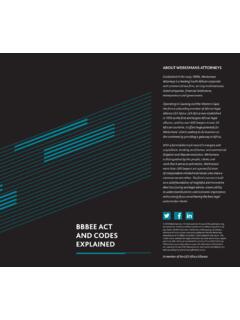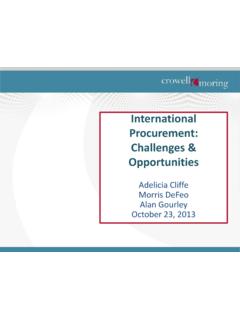Transcription of South Africa - Werksmans
1 GLI - Bribery & corruption First Edition50 LoxtonWerksmans Attorneys South AfricaOverview of the law and enforcement regimeThe most important sources of criminal law in South Africa are legislation, common law and case law. South Africa is one of the few countries in the world in which the substantive criminal law has not been set out in a single act or code. One must accordingly turn to various pieces of legislation when seeking guidance on the legal regime in South Africa . The common law of South Africa is Roman Dutch Law which has, over the years, been adopted and set out in our case law. It is important to note than in South Africa , the principle of judicial precedent is Constitution of the Republic of South Africa is the supreme law of the land, and all laws must be compatible with the Bill of Rights as set out in the Constitution.
2 If a rule of law is incompatible with the Bill of Rights it may be struck down by a court as null and void. This applies also to the rules governing criminal Criminal Procedure Act of 1977 governs all procedures and related matters in criminal proceedings. South Africa is party to a number of international agreements and conventions aimed at combating corruption . An example of these is the Southern African Development Community Protocol Against corruption . Arising from these various protocols and conventions, South Africa has obligations to take various steps to stamp out corruption . These are to: establish an independent anti- corruption agency; ensure that steps are taken to investigate and prosecute corruption ; prevent corruption by removing obvious opportunities for corruption ; educate the public on the harm caused by corruption ; ensure transparency and access to information when combating corruption ; establish mechanisms that encourage participation by the media, civil society and non-governmental organisations in the fi ght against corruption ; adopt measures that address corruption in the public and private sector.
3 And co-operate with and assist other states in criminal line with these obligations South Africa has passed various pieces of anti- corruption legislation. The main anti- corruption law is the Prevention and Combating of Corrupt Activities Act 2004 ( PACCA ). PACCA creates a general offence of corruption that is extremely broadly defi ned. It also criminalises certain specifi ed corrupt activities. PACCA applies to both the public and private sector. Generally speaking, a person is guilty of an offence in terms of PACCA if he directly or indirectly accepts or offers to accept a gratifi cation (as defi ned) from another person, or gives or agrees to give a gratifi cation to any other person for his benefi t, or that of another.
4 The giving or acceptance must be done in order to induce the other party to act in an improper manner, in the performance of that individual s underlying principle is that guilt will be determined by intention. The test is a subjective one which takes into account all surrounding circumstances, the particular conduct of the parties, and any other relevant information to decide the intention. The fact that the corrupt activity was unsuccessful is not relevant. It is suffi cient that there is merely a threatened infringement of an interest. How far the corruption has extended for the parties to reach accord, may have a bearing on the sentence.
5 This GLI - Bribery & corruption First Edition51 Attorneys South Africais the same principle which applies to an attempt to commit a crime which is generally punished more leniently than the actual commission of the fact that the recipient of the gratifi cation does not have the power or right to do what the giver wishes him/her to do, is also irrelevant. If for example, X gives Y a gratifi cation in the belief that Y will give him/her a tender to which he or she is not entitled, but it transpired that it is not Y who will decide upon the award of the tender, such a mistake will afford neither X nor Y a defence to a prosecution for is a crime of double intent.
6 The recipient of a gratifi cation must not only have the intention of accepting the gratifi cation, but also have the intention of acting in a certain way in return for the gratifi sets out specifi c categories of offences of corruption . These include corrupt activities relating to: public offi cers; foreign public offi cials; agents; members of legislative authorities; judicial offi cers; and members of prosecuting , PACCA provides that corrupt activities relate to various specifi c matters, including: witnesses; contracts; tenders; auctions; sporting events.
7 And gambling or games of is also a miscellaneous category of offences which include acquisition of a private interest in a contract, and interfering with or obstructing the investigation of an does have extra-territorial jurisdiction if certain requirements are met. Thus a South African citizen, or someone who ordinarily resides in South Africa , as well as companies incorporated or registered in South Africa , can be prosecuted in terms of PACCA regardless of whether the offensive act constitutes an offence at the place of its provision which is unique to PACCA is the provision dealing with the failure to report corruption .
8 A person in a position of authority who has knowledge or suspicion of an offence of corruption , theft, fraud, extortion, forgery or uttering a forged document, under PACCA, has a duty to report this to the South African Police Services. The theft, fraud, extortion, forgery and uttering, must involve an amount of R100, or more. If he fails to do so, he himself is guilty of an offence and can be imprisoned for a period of up to ten years. The particular section lists persons who are regarded as persons who hold a position or authority. For example, partners in a partnership, and persons responsible for the overall management and control of the business of an employer, would be regarded as holding a position of section refers to anyone who knows or ought reasonably to have known.
9 Accordingly the form of culpability required for this particular offence is either intention or PACCA is the primary anti- corruption legislation in South Africa , there are a number of other pieces of legislation dealing with corruption and crimes of dishonesty. These include the Financial Intelligence Centre Act (FICA), the Prevention of Organised Crime Act (POCA), the Public Finance Management Act (PFMA), the Municipal Finance and Management Act (MFMA), the Protected Disclosures Act (PDA), and the Companies Act. Briefl y, the important provisions in these pieces of legislation are as follows: FICA provides for a framework to identify suspicious proceeds possibly derived from illegal activities.
10 It is designed primarily to stamp out money laundering activities and terrorist fi nancing. The Financial Intelligence Centre established in terms of FICA does not have any investigative GLI - Bribery & corruption First Edition52 Attorneys South Africapowers, but it has been established to support the existing investigative bodies and other role-players in the intelligence and criminal justice system. Its principal objective is to assist in identifying the proceeds of unlawful activities and then to combat money laundering, terrorist fi nancing and related activities. As such, it makes information collected by it available to investigating authorities, the Intelligence Services and the South African Revenue Services to assist in the administration and enforcement of South Africa s laws.














